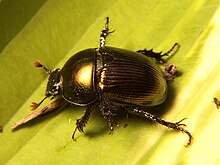
Geotrupidae

| Geotrupidae | |
|---|---|

| |
| Geotrupes egeriei | |
| Scientific classification | |
| Domain: | Eukaryota |
| Kingdom: | Animalia |
| Phylum: | Arthropoda |
| Class: | Insecta |
| Order: | Coleoptera |
| Suborder: | Polyphaga |
| Infraorder: | Scarabaeiformia |
| Superfamily: | Scarabaeoidea |
| Family: | Geotrupidae Latreille, 1802 |
| Genera | |
|
25, see text | |
Geotrupidae (from Greek γῆ (gē), earth, and τρῡπητής (trȳpētēs), borer) is a family of beetles in the order Coleoptera. They are commonly called earth-boring dung beetles or dor beetles.[1] Most excavate burrows in which to lay their eggs. They are typically detritivores, provisioning their nests with leaf litter (often moldy), but are occasionally coprophagous, similar to dung beetles. The eggs are laid in or upon the provision mass and buried, and the developing larvae feed upon the provisions. The burrows of some species can exceed 2 metres in depth.

A few species communicate by stridulation (rubbing body parts together to make sounds).

Classification
They were originally [when?] classified as the subfamily Geotrupinae in the family Scarabaeidae before being elevated to a family. Traditionally the family Bolboceratidae was included (as the subfamily Bolboceratinae) on the basis of the number of antenna segments, but examination of a different set of characteristics prompted Scholtz & Browne (1995) to elevate Bolboceratidae to a family, a result supported by recent phylogenetic research.[2]

The family has more than 600 species in about 30 genera in two subfamilies; recent [when?] phylogenetic studies indicate that Taurocerastinae is not related to Geotrupinae, and is instead more closely related to Lucanidae and Diphyllostomatidae.[2]

- Geotrupinae
- Allotrypes François, 1904 (= "Allotrupes" Boucomont, 1912)
- Anoplotrupes Jekel, 1866
- Baraudia López-Colón, 1996
- Ceratophyus Fischer von Waldheim, 1823
- Ceratotrupes Jekel, 1865
- Chelotrupes Jekel, 1866
- Cnemotrupes Jekel, 1866
- Cretogeotrupes Nikolajev, 1992
- Enoplotrupes Lucas, 1869
- Geohowdenius Zunino, 1984
- Geotrupes Latreille, 1796
- Halffterius Zunino, 1984
- Haplogeotrupes Nikolaev, 1979
- Jekelius López-Colón, 1989
- Lethrus Scopoli, 1777
- Megatrupes Zunino, 1984
- Mycotrupes LeConte, 1866
- Odontotrypes Fairmaire, 1887
- Onthotrupes Howden, 1964
- Phelotrupes Jekel, 1866
- Peltotrupes Blanchard, 1888
- Pseudotrypocopris Miksic, 1954
- Sericotrupes Zunino, 1984
- Silphotrupes Jekel, 1866
- Thorectes Mulsant, 1842
- Trypocopris Motschulsky, 1860
- Typhaeus Leach, 1815
- Zuninoeus López-Colón, 1989
- Taurocerastinae
- Frickius Germain, 1897
- Taurocerastes Philippi, 1866
References
- ^ Geotrupidae - Dor beetles (at NatureSpot)
- ^ a b MCKENNA, D. D., WILD, A. L., KANDA, K., BELLAMY, C. L., BEUTEL, R. G., CATERINO, M. S., FARNUM, C. W., HAWKS, D. C., IVIE, M. A., JAMESON, M. L., LESCHEN, R. A. B., MARVALDI, A. E., MCHUGH, J. V., NEWTON, A. F., ROBERTSON, J. A., THAYER, M. K., WHITING, M. F., LAWRENCE, J. F., ŚLIPIŃSKI, A., MADDISON, D. R. and FARRELL, B. D. (2015), The beetle tree of life reveals that Coleoptera survived end-Permian mass extinction to diversify during the Cretaceous terrestrial revolution. Syst Entomol, 40: 835–880. doi:10.1111/syen.12132
External links
- D. Jonathan Browne and Clarke H. Scholtz, Bolboceratidae, from the Tree of Life
- Key to the British species of family Geotrupidae
- Video of Geotrupes from Hungary
- UNL. Geotrupidae
See what we do next...
OR
By submitting your email or phone number, you're giving mschf permission to send you email and/or recurring marketing texts. Data rates may apply. Text stop to cancel, help for help.
Success: You're subscribed now !
